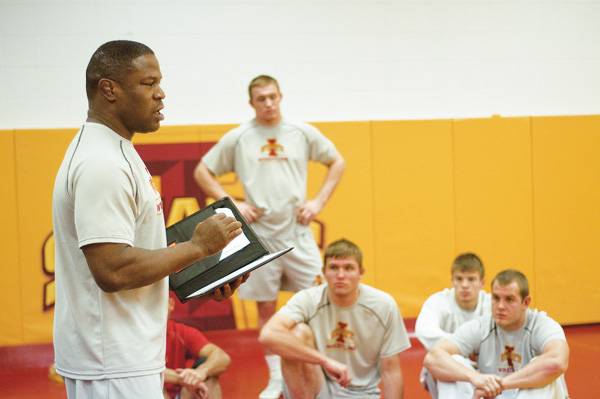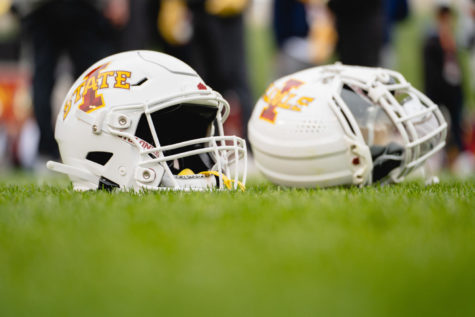ISU ties combat committee’s proposal to drop wrestling

Head Coach Kevin Jackson discusses performance with wrestlers on Tuesday, Nov. 3, in Lied Rec Center. Photo: Logan Gaedke/Iowa State Daily
February 12, 2013
Ever since he was 8 years old, Kyven Gadson has dreamed of becoming an Olympic gold medalist.
But that dream could come crashing down in the wake of the International Olympic Committee’s proposal to drop wrestling as an Olympic sport, which sparked national buzz when it was announced Tuesday.
If ratified, wrestling would be no longer be an Olympic sport starting in the 2020 games.
“We’re definitely not happy about it,” Gadson said. “I’m just trying to find ways that [I] can have a voice in it.”
Gadson, a 197-pound redshirt sophomore at Iowa State, said his original goal was to compete in the 2016 Olympic Games in Rio de Janeiro. However, the possibility of not having that fallback option of 2020 increases the pressure a bit.
“You’ve got to point toward 2016 at this time,” said ISU coach Kevin Jackson. “It affects us, but it doesn’t affect us immediately. There’s some things that we have to do as a country, and there’s some hoops that we have to jump through.
“As a wrestling community, as a wrestling person, there’s no way we’re giving up on this thing, because we know we’re in the right as far as wrestling’s inclusion in the Olympic Games.”
The proposal comes at the expense of the rich history Iowa State has in the sport: Six former ISU wrestlers have won Olympic gold medals while 17 former wrestlers and coaches have competed or coached in the Olympic Games.
As one of the six Olympic gold medalists that Iowa State has produced, Jackson went on to serve as head coach of Team USA in the 2004 and 2008 Olympic Games before taking his current post as the ISU wrestling coach.
The International Olympic Committee was reportedly planning on cutting the modern pentathlon but instead opted to cut freestyle, Greco-Roman and women’s wrestling on the basis of global participation and popularity.
“It’s one of the greatest injustices ever perpetrated by the Olympic committee,” said former USA Wrestling coach Bobby Douglas, who coached at Iowa State from 1992 to 2006. “It’s all driven by money, greed and corruption.”
One of the criteria the IOC had used to justify its decision was television ratings, which was questioned in its ability to accurately gauge popularity of a sport.
“Now, you know like I know that we’re going to watch anything that NBC puts on,” Jackson said. “If they put on two guys rolling marbles, we’re going to watch that if a gold medal’s on it. So that’s NBC’s job to put on proper programming.”
However, the IOC is set to vote on whether or not to officially drop wrestling in May with a final decision to be made in September.
“It’s not final,” said Ed Banach, who won a gold medal in the 1984 Olympic Games. “We’ll find out for sure at that time, but you’ve got to think … everybody wrestles.
“The pushback that the IOC is going to receive based upon the support for wrestling internationally, they’re going to be overwhelmed.”
A storied history
Wrestling was one of the founding sports of the ancient Olympic games, dating back to ancient times. When the modern era of the Olympic games began in 1896, wrestling was one of nine sports on the bill.
“One of the final events that they did was wrestle to determine the winner of the first Olympic games,” Banach said. “It was integral to the Olympic movement, so why would you take wrestling out?”
The sport has since progressed in the Olympics, remaining intact as a part of international competition until the announcement Tuesday.
“America was targeted,” Douglas said. “One of the reasons it’s so easy to get rid of wrestling is because of the success that America has had in the program.”
The United States has won 125 medals total in freestyle, Greco-Roman and women’s wrestling combined — more than any other country. America is second in gold medals with 50 to the former Soviet Union, which has 62.
America’s most recent medalists include Clarissa Chun (bronze in women’s 48 kilograms), Coleman Scott (bronze at 60), Jordan Burroughs (gold at 74) and former Cyclone Jake Varner (gold at 96).
“For the IOC to drop wrestling, yeah it makes a splash,” Banach said. “But I think they’re going to regret that decision, and they’re going to make a change here in the next couple months.”
Holding onto the dream
As a member of the diversity committee for USA Wrestling, Douglas was irate at the IOC’s announcement.
“A lot of minority kids go to school because they’re driven by the Olympic dream,” Douglas said. “They want to have the chance like the rest of the world to compete in the Olympic Games — that’s huge for the wrestling community.”
Had it not been for the Olympic dream, Douglas said wrestling would not have grown as a collegiate sport in America.
“I came here expecting to be a national champ and then go on to win my Olympic gold medal,” Gadson said.
When asked about the impact the Tuesday decision from the committee would have on collegiate wrestling, Jackson said the only real repercussions is the inability to achieve that Olympic dream.
“It’s almost a shame that it pushes our athletes to use their ability in sports like MMA,” Jackson said. “It forces them to possibly take their skills that they harnessed for 20 years and to move in that direction. I find that very disappointing.”
As for Gadson, all he will have to do is wait and see.
“We don’t have a major leagues or anything like that,” Gadson said. “For us wrestlers, we don’t have anything after college. So it’s kind of crazy that it could be taken away from us.”
















